Australian Government Sells Servers Containing Confidential Information
 Let’s start this week’s news with some nice, old-fashioned, technological paranoia: As a teenager, you start to realise that giving everyone your mobile number, letting people know where you live and freely handing out your email address can be a bad thing. Imagine my surprise then when I found out that the Australian government had sold 18 of its servers at a government auction, all carrying confidential information, without erasing any data from them. “Who did they sell these to?” I hear you ask … Well no, it’s not some big company, it’s an individual called Geoffrey Huntley, who has his own blog and who promptly wrote about the issue of these servers having confidential information on them at sale. Using a basic knowledge of AIX, the operating system these servers were running, it was then possible to access all the information on every server, including financial information and emails sent and received.
Let’s start this week’s news with some nice, old-fashioned, technological paranoia: As a teenager, you start to realise that giving everyone your mobile number, letting people know where you live and freely handing out your email address can be a bad thing. Imagine my surprise then when I found out that the Australian government had sold 18 of its servers at a government auction, all carrying confidential information, without erasing any data from them. “Who did they sell these to?” I hear you ask … Well no, it’s not some big company, it’s an individual called Geoffrey Huntley, who has his own blog and who promptly wrote about the issue of these servers having confidential information on them at sale. Using a basic knowledge of AIX, the operating system these servers were running, it was then possible to access all the information on every server, including financial information and emails sent and received.
This sort of occurrence does make me think that it is unsafe to give anyone information, unless I know it is safe with them, as it could all too easily fall into the wrong hands. More must be done to safeguard people’s information in this age of hacking and phishing, where anything not bolted down to the virtual ground is electronically stolen by people who wish to use this information for profit.
The Australian government, it seems, has tried to hush the issue up, as the Web page that originally documented the sale of confidential information carrying servers has now been erased from Geoffrey Huntley’s blog, although it is still available, as above, from a mirroring service.
 DRM on motherboards
DRM on motherboards
As well as compromising people’s privacy, technology can also restrict people’s freedom: Everyone’s known it’s been coming for a long while, but DRM (Digital Right’s Management) chips have started to be incorporated into motherboards. Although at present these are only present in Apple’s new Intel developer machines, Windows looks set to follow suit in its next release and require these chips to be implemented. What these sort of chips do, is to enable applications to make sure that a file or program will only work on the computer which has the right DRM chip. If this sounds similar to the current ways of protecting intellectual property with serial numbers, then think again: These serial numbers will be built-in to computer’s mother boards, meaning that they cannot be changed. For me, this is quite a serious blow, as I like to have the freedom to choose what sort of media I want to play, and from where I get it. This sort of inflexible and likely uncircumventible control could also allow computer manufacturers to enforce people to use a certain OS or certain software. With Microsoft’s clout and their habit of making sure that manufacturers of computers are tied into an agreement of bundling Windows with their computers, they might also enforce them to bundle chips with their motherboards that make them only boot Windows. These upcoming technologies will doubtlessly hurt consumers, but it remains to be seen how restrictive they will be.
Mighty Mouse: Apple’s Multi-Button Mouse
 In other news: After years of Apple thinking themselves obviously superior by having just the one mouse button, and after years of jokes about how Mac users are inferior because they can’t use more than the one button, Apple has gone back and decided to bring out a mouse with not one, not two, but three buttons, as well as a four way scroll wheel. They have called their mouse, quite simply, Mighty Mouse. What’s so special about this though, and what sets it apart from the hordes of multi-button, Mac-compatible mice out there on the market? The answer is, the mouse has no physical buttons at all! The mouse incorporates iPod-esque touch sensitive technology to make the mouse appear button-less, but still work just fine. Very nice. An earlier argument of many Mac-users was that having just one button on a mouse made computing more accessible to beginners and so called technology-virgins, and I can agree with that statement: Teaching my Mum to use a PC is still a work in progress, and she still asks which button to click. Teaching her to use a Mac, on the other hand, was simply a matter of telling her how to turn the machine on, and what her login password was. Anyway, the new mouse from Apple, having no physical buttons, is programmable to have either one, two or three buttons, meaning that users can specify, on a user-specific basis, which features of the mouse they would like to have, and which ones they would like to leave well alone. What this means, is that You, your Gran, and your Mum can all use the same computer with the same mouse, but still all have as many buttons as suits them and their computing abilities. The mouse should also work just fine with a Windows computer, although from personal experience, trying to use Windows with one mouse button is a bad experience!
In other news: After years of Apple thinking themselves obviously superior by having just the one mouse button, and after years of jokes about how Mac users are inferior because they can’t use more than the one button, Apple has gone back and decided to bring out a mouse with not one, not two, but three buttons, as well as a four way scroll wheel. They have called their mouse, quite simply, Mighty Mouse. What’s so special about this though, and what sets it apart from the hordes of multi-button, Mac-compatible mice out there on the market? The answer is, the mouse has no physical buttons at all! The mouse incorporates iPod-esque touch sensitive technology to make the mouse appear button-less, but still work just fine. Very nice. An earlier argument of many Mac-users was that having just one button on a mouse made computing more accessible to beginners and so called technology-virgins, and I can agree with that statement: Teaching my Mum to use a PC is still a work in progress, and she still asks which button to click. Teaching her to use a Mac, on the other hand, was simply a matter of telling her how to turn the machine on, and what her login password was. Anyway, the new mouse from Apple, having no physical buttons, is programmable to have either one, two or three buttons, meaning that users can specify, on a user-specific basis, which features of the mouse they would like to have, and which ones they would like to leave well alone. What this means, is that You, your Gran, and your Mum can all use the same computer with the same mouse, but still all have as many buttons as suits them and their computing abilities. The mouse should also work just fine with a Windows computer, although from personal experience, trying to use Windows with one mouse button is a bad experience!
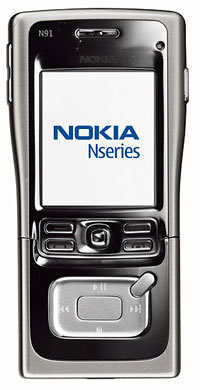 Speculation about Reuters reported than Kari Tuutti, spokesman for Nokia’s multimedia division said, “There is no commercial agreement between Nokia and Apple to integrate iTunes into the N-series devices.”
Speculation about Reuters reported than Kari Tuutti, spokesman for Nokia’s multimedia division said, “There is no commercial agreement between Nokia and Apple to integrate iTunes into the N-series devices.” In a making-the-most-out-of-a-difficult-situation way, Kari went on to say, “But since this is based on a computer platform, anybody — including Apple if they so wish — can very easily develop this kind of application and offer it to consumers, via the Internet for example.”
In a making-the-most-out-of-a-difficult-situation way, Kari went on to say, “But since this is based on a computer platform, anybody — including Apple if they so wish — can very easily develop this kind of application and offer it to consumers, via the Internet for example.”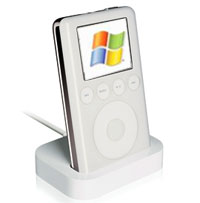 Apple may be forced to shell out royalties to Microsoft for every single iPod it sells after it emerged that Microsoft was first to file a crucial patent on technology used in its iPod.
Apple may be forced to shell out royalties to Microsoft for every single iPod it sells after it emerged that Microsoft was first to file a crucial patent on technology used in its iPod.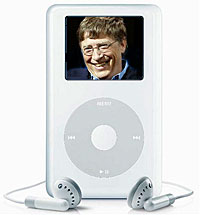 The application doesn’t identify the iPod by name (usual for such petitions), describing a “portable, pocket-sized multimedia asset player” capable of managing MP3 music files including “a song title, a song artist, a song album, a song length”
The application doesn’t identify the iPod by name (usual for such petitions), describing a “portable, pocket-sized multimedia asset player” capable of managing MP3 music files including “a song title, a song artist, a song album, a song length”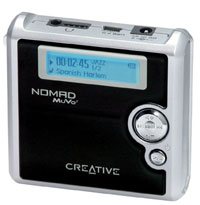
 First of all, space is cool from the perspective of a teenager, and there’s no worrying about how much tax payers money is put into these kind of projects. With this in mind, I was delighted to hear that the Shuttle
First of all, space is cool from the perspective of a teenager, and there’s no worrying about how much tax payers money is put into these kind of projects. With this in mind, I was delighted to hear that the Shuttle  Let’s start this week’s news with some nice, old-fashioned, technological paranoia: As a teenager, you start to realise that giving everyone your mobile number, letting people know where you live and freely handing out your email address can be a bad thing. Imagine my surprise then when I found out that the Australian government had
Let’s start this week’s news with some nice, old-fashioned, technological paranoia: As a teenager, you start to realise that giving everyone your mobile number, letting people know where you live and freely handing out your email address can be a bad thing. Imagine my surprise then when I found out that the Australian government had  DRM on motherboards
DRM on motherboards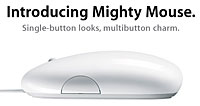 In other news: After years of Apple thinking themselves obviously superior by having just the one mouse button, and after years of jokes about how Mac users are inferior because they can’t use more than the one button, Apple has gone back and decided to bring out a mouse with not one, not two, but three buttons, as well as a four way scroll wheel. They have called their mouse, quite simply,
In other news: After years of Apple thinking themselves obviously superior by having just the one mouse button, and after years of jokes about how Mac users are inferior because they can’t use more than the one button, Apple has gone back and decided to bring out a mouse with not one, not two, but three buttons, as well as a four way scroll wheel. They have called their mouse, quite simply, 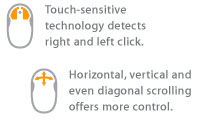 Apple’s stubborn refusal to include more than one button on its standard mouse has long brought scorn from the Windows community who were at a loss to understand why Mac users were being deprived of the clear productivity benefits of multi-buttoned mouses (Mice? Micii?)
Apple’s stubborn refusal to include more than one button on its standard mouse has long brought scorn from the Windows community who were at a loss to understand why Mac users were being deprived of the clear productivity benefits of multi-buttoned mouses (Mice? Micii?)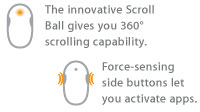 Naturally, Apple have added a little bit of pizzazz to the design, hiding the touch-sensitive technology under a plain shell. This detects which part of the mouse is being clicked, letting users left- and right-click.
Naturally, Apple have added a little bit of pizzazz to the design, hiding the touch-sensitive technology under a plain shell. This detects which part of the mouse is being clicked, letting users left- and right-click. Apple’s new feast of buttons will work on Mac OS X (programmability requires Mac OS X v10.4.2 Tiger or later) and Windows 2000 or Windows XP.
Apple’s new feast of buttons will work on Mac OS X (programmability requires Mac OS X v10.4.2 Tiger or later) and Windows 2000 or Windows XP.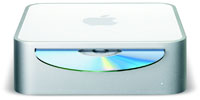 Apple Computer has unveiled updates to its iBook laptop and Mac Mini lines, lobbing in new features, more memory and built in wireless technology – although the anticipated widescreen models failed to run up at the launch party.
Apple Computer has unveiled updates to its iBook laptop and Mac Mini lines, lobbing in new features, more memory and built in wireless technology – although the anticipated widescreen models failed to run up at the launch party.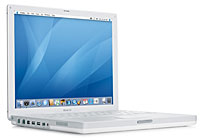 The new iBook G4s now come with a faster Power PC G4 processor running up to 1.42 GHz, with 512MB memory as standard, higher performance graphics and built-in AirPort Extreme and Bluetooth wireless connectivity.
The new iBook G4s now come with a faster Power PC G4 processor running up to 1.42 GHz, with 512MB memory as standard, higher performance graphics and built-in AirPort Extreme and Bluetooth wireless connectivity.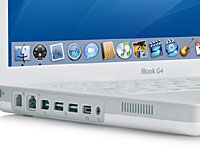 The 1.33 GHz PowerPC with 12″ screen G4 iBook retails at £699/US$999 and its bigger 1.42 GHz PowerPC G4 iBook with 14″ display knocks out for £899/US$1299.
The 1.33 GHz PowerPC with 12″ screen G4 iBook retails at £699/US$999 and its bigger 1.42 GHz PowerPC G4 iBook with 14″ display knocks out for £899/US$1299.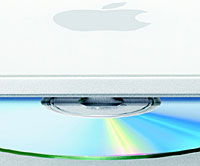 The diminutive Mac Mini range features three new models – the 1.25 GHz Mac Mini, 1.42 GHz Mac mini and the new 1.42 GHz Mac Mini with SuperDrive – with memory upgraded to 512 MB throughout.
The diminutive Mac Mini range features three new models – the 1.25 GHz Mac Mini, 1.42 GHz Mac mini and the new 1.42 GHz Mac Mini with SuperDrive – with memory upgraded to 512 MB throughout. What with the summer in full swing, and the weather in the good old UK being as warm as it has been, I have observed some serious heat issues while using my Mac Mini.
What with the summer in full swing, and the weather in the good old UK being as warm as it has been, I have observed some serious heat issues while using my Mac Mini. At first, I had put it down to my Mac simply not running as well as it used to for whatever reason, but today it’s been considerably cooler because it’s rained, and all of a sudden my Mac Mini is running perfectly again.
At first, I had put it down to my Mac simply not running as well as it used to for whatever reason, but today it’s been considerably cooler because it’s rained, and all of a sudden my Mac Mini is running perfectly again.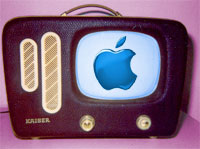 The rurmour mill continues to hum with speculation that Apple are set to introduce a video playing iPod-like device in the near future.
The rurmour mill continues to hum with speculation that Apple are set to introduce a video playing iPod-like device in the near future.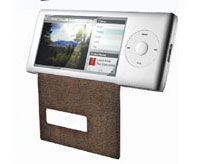 This has led to speculation that the company will be revising the iPod to create something like the ‘vPod’, a concept device created by design firm Pentagram which was published in Business 2.0 Magazine in March.
This has led to speculation that the company will be revising the iPod to create something like the ‘vPod’, a concept device created by design firm Pentagram which was published in Business 2.0 Magazine in March.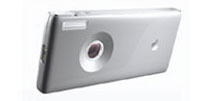 The big problem with trying to create a multimedia device is that people demand quite different things for mobile audio and video.
The big problem with trying to create a multimedia device is that people demand quite different things for mobile audio and video.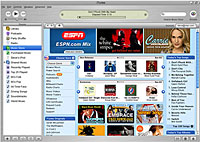 The Apple rumour mill has been cranking into overdrive over the weekend after Forbes reported that the company may be considering becoming a mobile phone operator.
The Apple rumour mill has been cranking into overdrive over the weekend after Forbes reported that the company may be considering becoming a mobile phone operator.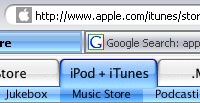 However, a report in the Sunday Telegraph yesterday claimed that Motorola will finally “unveil the first fruits of its partnership with Apple next month with the launch of its iTunes mobile phone at the V Festival.” The festival runs from 20th to 21st August 2005.
However, a report in the Sunday Telegraph yesterday claimed that Motorola will finally “unveil the first fruits of its partnership with Apple next month with the launch of its iTunes mobile phone at the V Festival.” The festival runs from 20th to 21st August 2005.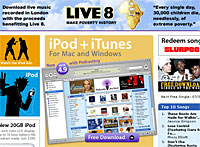 Hot on the heels of the hugely successful Live8 concert in London, Apple’s iTunes Music Store has made the opening performance of The Beatles’s “Sergeant Pepper” (sung by McCartney with U2) available for purchase through its store.
Hot on the heels of the hugely successful Live8 concert in London, Apple’s iTunes Music Store has made the opening performance of The Beatles’s “Sergeant Pepper” (sung by McCartney with U2) available for purchase through its store. Distribution is to be exclusively digital, so there will be no physical product. All profits are to be donated to Live 8, “and the fight for the future of Africa”, according to the iTunes Website.
Distribution is to be exclusively digital, so there will be no physical product. All profits are to be donated to Live 8, “and the fight for the future of Africa”, according to the iTunes Website.